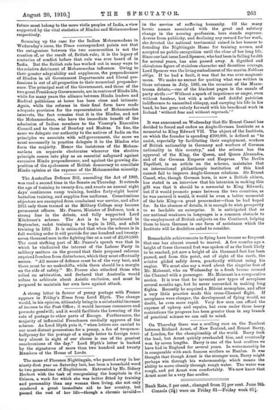The name of Florence Nightingale, who passed away in her
ninety-first year on Saturday last, has been a household word to two generations of Englishmen. Entrusted by Mr. Sidney Herbert with the task of reorganising the hospitals in the Crimea, a work for which she was better fitted by training and personality than any woman then living, she not only rendered a great immediate aid to her country, but passe. d the rest of her life—though a chronic invalid— in the service of suffering humanity. Of the many heroic names associated with the great and salutary change in the nursing profession, hers stands supreme. Averse from publicity, and declining any reward for her work, she devoted the national testimonial raised in her honour to founding the Nightingale Home for training nurses, and accepted no public recognition until the close of her long life. Since our last issue Lord Spencer, who had been in failing health for several years, has also passed away. A dignified and chivalrous figure of stainless character and dauntless courage, Lord Spencer was the living embodiment of the maxim Noblesse oblige. If he had a fault, it was that he was over-magnani- mous. We make no excuse for quoting what was written in these columns in July, 1885, on the occasion of the Maam- trasna debate,—one of the blackest pages in the annals of party strife :—" Without a spark of impatience or anger, even without hauteur, but with a noble and dutiful patrician indifference to unmerited obloquy, and carrying his life in his hand, he has gone calmly forward with his beneficent work in Ireland without fear and without reproach.' "






































 Previous page
Previous page